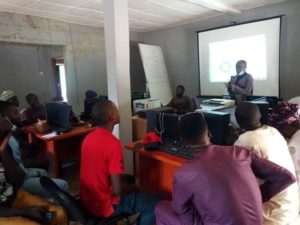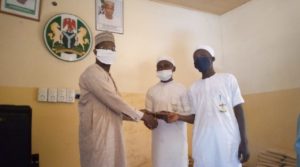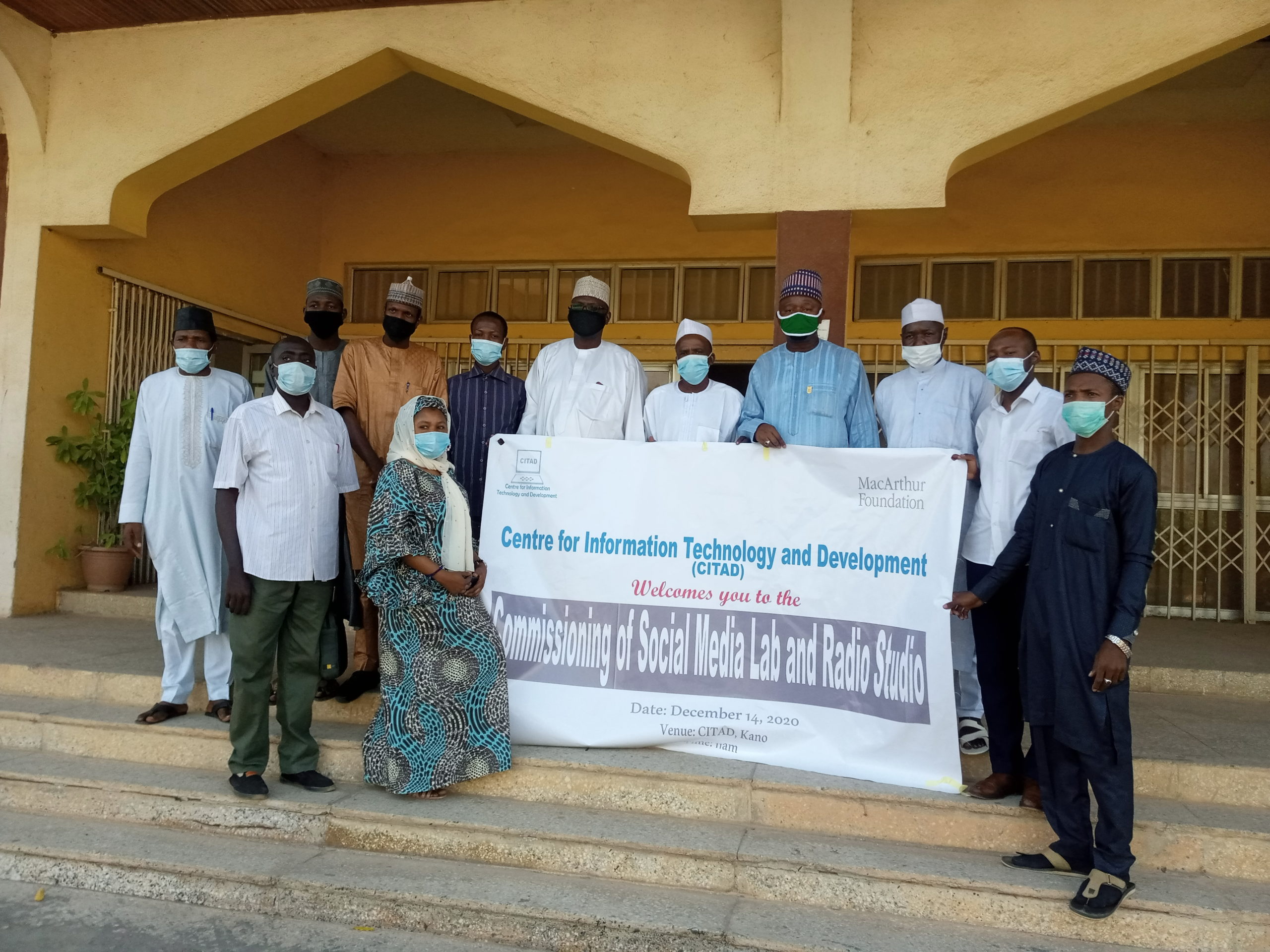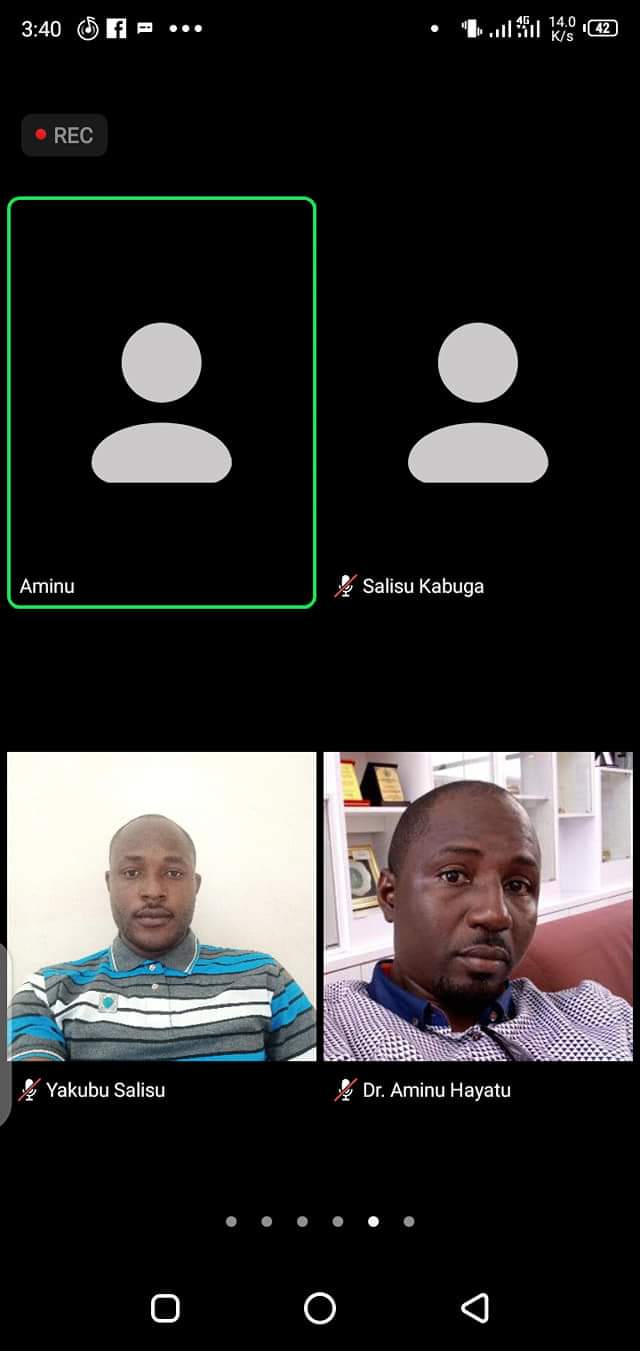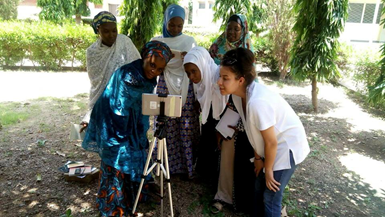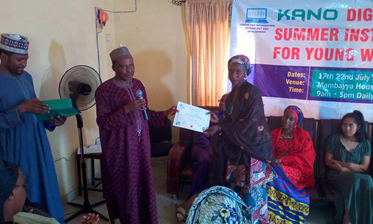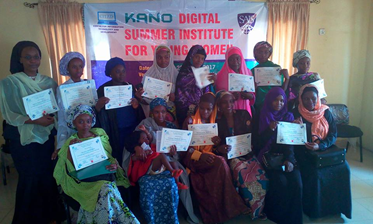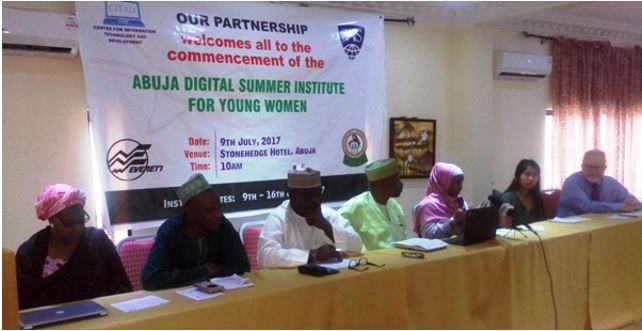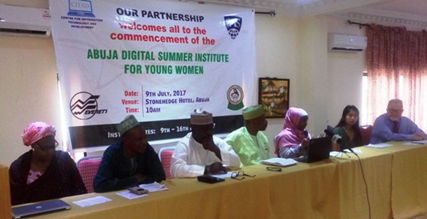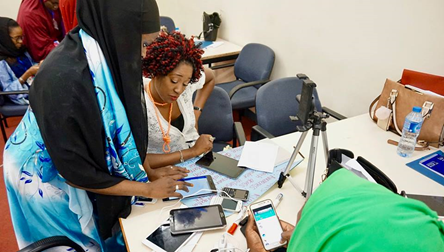CENTER FOR INFORMATION TECHNOLOGY AND DEVELOPMENT (CITAD), WITH SUPPORT FROM ASSOCIATION FOR PROGRESSIVE COMMUNICATION (APC)
Â
A POST-PROGRAMME RESEARCH (EVALUATION STUDY)
Â
Â
MAY, 2018
 Â
Abstract
This research is an evaluation study which was carried out in order to find out impacts the radio programme, ‘Mu Tsaftace Yanar Gizo,’ has made on its audiences. The one hour weekly programme titled, “Mu Tsaftace Yanar Gizo†on Freedom radio, 99.5FM, is usually broadcasted in Hausa language. The programme has its primary goal of combating Gender Based Violence Online and creating awareness on the importance of the Internet especially to women in Northern Nigeria. By the time this research was conducted, 10 different episodes of the programme have been broadcasted and thus, made it a necessity to undergo another research in order to understand the impact as well as generate audiences’ views about the challenges as well as way they think the programme can be enhanced. The results gathered from the study have shown that “Mu Tsaftace Yanar Gizo†radio programme has made an effective impacts on the listeners as most women in the study are now confidential in the use of the internet, at the same time; their awareness on the importance of the internet to them has increased greatly.
1.0 Background of the Study
In previous researches conducted by Center for Information Technology and Development (CITAD) 2017, women in Kano state who were the primary respondents in the studies (and men in some cases), revealed that they have been subjected to different types of gender based violence online, more specifically, social networking sites such as Facebook, WhatsApp, Instagram, Twitter and Viber. Among the most common violence they do encounter according to the studies were unwanted/unsolicited messages, pornographic materials/indecent materials and exposure of private life by someone. These have discouraged the willingness of women to use the internet, and at the same time, they reported that these have posed fears in their minds whenever they want to use the internet, while some have completely avoid using the internet as a result of one or another form of GBVO they have experienced. A good number of the respondents confessed that they don’t know the tools and don’t use them online and are not competent in using the online protection tools.
It was against this background, CITAD, with support from APC embarked on an advocacy for a safe internet for women free of violence. This campaign has both offline and online components. The offline component involved weekly interactive radio programme on Freedom radio, 99.5FM, Kano. In each week, different topic related to gender violence online and or online safety tools were treated with experts in the field of ICT and Cyber security. The programme was aired for 13 weeks, from January 09-10 April, 2018.
Consequently, a post programme research was set to understand the impacts the radio programme has made on its listeners which are primarily women and girls after 13 episodes of the programme has being aired.
 2.0 Objectives of the Study
- To examine the level of the listeners’ understanding on the term “GBVO.â€
- To assess how conversant the listeners are with online safety and protection tools.
- To find out benefits the audience gained from the programme.
- To find out challenges to the programme.
3.0 Methodology
The study attempted to gather more reliable data. The study therefore employed qualitative approach in gathering the data. The qualitative technique involved a Focus Group Discussion with some female listeners of “Mu Tsaftace Yanar Gizo.†Male listeners of the programme were also examined and they constituted secondary respondents in the study. This was to understand the impacts this programme has made not only on the females who are mostly the victims, but also on the males, who are the perpetrators of the gender violence online. All respondents in this study are either regular listeners of “Mu Tsaftace Yanar Gizo†or have listened to the programme at least twice.
Five set of FGDs were conducted with a total of 50 participants in the following groups:
- Housewives (10 participants),
- Female students (10 participants),
- Female workers (10 participants),
- Male students (10 participants),
- Male youths (10 participants).
4.0 Data Presentation
- Benefits gained from the programme
The respondents were asked to explain the benefits they think they have derived from the programme. All respondents said they have benefited with one thing or another from this programme. Six among the housewives explained that before they started listening to the programme, they had no idea on how to trace and take action on someone who disguises himself on the internet to deceive them, but listening to the programme has taught them how to follow issues up and face relevant authority for redress. Five among the female students also explained that they only learned that they can block anybody who tries to harass or intimidate them on either Facebook, Twitter or Instagram from the programme.
Another key learning as expressed by some respondents comprising of both male and female workers as well as female students groups was using letters, characters, numbers and symbols to create a unique and “strong password†in order to make it difficult for hackers or intruders to break into. They revealed that prior to listening to the programme they had no skills of differentiating between strong and weak password nor did they know its importance in securing their accounts on the internet, but they are now “sensitive†to issues of securing their accounts. The programme has also taught them how to arrange letters, characters, numbers and symbols in order to come up with strong password.
According to some respondents from the youth and the housewives groups, what they learnt was how to verify friendship request on Facebook and other online platforms before accepting which gives them an idea on whether or not we should be friends with some people on different platforms.
Almost all respondents in from all groups agreed that they have now understood how women can benefit immensely from using internet such as how they can advertise their products and services on the internet from home, educate themselves on variety of topics-fashion, cooking, decoration etc. Some also mentioned that their understanding on GBVO has increased and have learned how to report harassment, intimidation or violence on Facebook, Twitter etc.
According three female respondents, their husbands whom they usually listen to the programme together now allowed them to use their Facebook accounts after they have previously banned them to due to the issues of online gender violence. They have now become comfortable with them using “Facebook and other online apps†since there are ways or measures women can take to prevent themselves or get the harassers punished.
Other key learning from the programme as explained by some the respondents include privatizing online accounts, knowledge on how to report online harassments to the police or other security agencies, cautious in using public WIFI and harms free apps could cause to their users.
According to some male respondents, the programme is a right step in the right direction because it has sensitized people on what remains a big challenge to women’s access of internet.
- Whether the programme has helped in eradicating fears of using the internet by women
This question was asked to compare the state of mind of the women when using the internet before and after the programme, this was because, in early researches that were conducted prior to the programme, majority of the respondents agreed that their fear has drastically reduced as a result of the programme. Half of the female respondents in summation of all female groups explained that their fear of using the internet has completely been erased courtesy of the programme, About a quarter of the female respondents said they used to have fear earlier because many couples got separated due to violence online, but the programme was able to discuss issues around that and ably provided preventive measures, therefore they have no fear using the internet now. Six among the female respondents said they have ignored using the internet earlier, but with this programme, they are now using it. Another set of respondents, almost half a quarter, added that their fear of internet due to online gender violence has also reduced in parents’ mind because the programme has featured some of them in the programme and they expressed their concerns and measures were presented to address those concerns.
- What do we like most about the programme?
Almost half of the respondents both males and females groups said they liked the “sign tune†of the programme is what they like most, they differently gave reasons as the song tallies with the programme, the lyrics was in conversant with the ordeal of women on the internet. Some  explained that what they liked most about the programme was the way in which different resource persons were invited to talk on different topics. Four more mentioned that it was the phone-in segment where audience call and ask questions and how messages of the audience are read politely. Another set of seven male respondents said what they liked most was when victims of GBVO were hosted and they narrated what happened to them and later on advices and measures were proffered by other discussants. Three more still from male respondents said they liked the episode that talked about preventive tools and how women can use the internet to boost their knowledge of variety of things. Lastly, one male respondent stated that what he liked most in the programme was when a female lawyer was featured and she explained a number of things that he never knew before.
- What is it that you don’t like about the programme?
More than half (both male and female group) respondents mentioned that they did not like the fact that the programme was not repeated. They explained that the programme needed to be repeated at least once a week to allow for more listenership. The programme should have also been fixed at night time so that women will be at home by that time explained some women, because the present timing made it difficult for them to fully listen because they were either in school or different working places at the time it aired. About five men also shared similar view with that shared by the women where they think the timing was inappropriate. They suggested it should be aired in the night and repeated early the following morning.  Few others said the programme should have been fixed at weekends and evening time when women have little or less work to do. Few more from the male respondents said that the time allocated to audience messages and calls was too short, while two more respondents said they didn’t like audience messages being read at the end of the programme. The connectivity problem during the programme where audience found it difficult to call when the programme was on is what he dislikes about the programme. Lastly, two respondents suggested that the programme should have been provided in a podcast format so that it goes viral and shared on platforms such as WhatsApp, Facebook, Instagram.
- Whether the programme enlightened us on the significance of internet to women?
More than half of the respondents said yes to this question. They explained that the programme has significantly enlightened women on the usage of internet because there was an episode that discussed particularly how women could learn to cook, advertise their products and services on the net, how they can access literature, watch tutorials of how many things are done. Their understanding of online businesses has also increased. Only few among the respondents said they don’t think their knowledge on the significance of the internet has increased as a result of listening to the programme, while few others stated that they were already aware of the importance of the internet to women even before the programme.
- Whether the programme creates or increases understanding of the gender-based violence against women online
All respondents agreed that the programme has introduced them as well as increased their understanding of various forms of gender-based violence against women online and the actions or measures they can take when such incidences happen. The female respondents equally believed that they feel encouraged to challenge harassment or violence against them. Six male respondents said that their perception of GBVO was enriched to include other forms of violence against women that prior to the programme which they did not regard as GBVO before the programme. Another set of three male respondents said the programme has not only created awareness on GBVO in women and the males who are mostly the perpetrators, but in parents as well who deny their daughters access to the internet, but the programme has sensitized and encouraged parents to allow their daughters access internet. The tips and skills of preventing GBVO taught during the programme were the reasons for the decision of most parents to allow their daughters use the internet. One woman admitted it was the programmed that encouraged her to buy her daughters phones to be accessing the internet.
- Has the programme done anything to encourage its male audience to stop harassing women online?
This question was particularly asked in the FGDs with male groups. All respondents agreed that the programme has challenged and encouraged male gender to be supportive of the crusade against gender-based violence against women online. For instance, a respondent stated that many young guys create fake accounts with women’s pictures on their profile to perpetrate violence or ruin the image of the women, but the programme has sensitized those who do that. Another added that any men have now understood the danger of violence against women.
- 13 Discussion of Findings Based on Research Objectives
- To examine the level of the listeners’ understanding on the term “GBVO.â€
With a significance difference, the understanding of the women about the issue of GBVO has been enriched if compared with the findings of the pre-programme study that was conducted. Thus the study has enriched their knowledge of GBVO and has also sensitise the perpetrators of GBVO on the negative effects of such acts.
- To assess how conversant the listeners are with the online safety and protection tools.
From the findings of this research, it can be deduced that the women are now familiar or conversant with the protection tools available online; unlike in the pre-programme research where the respondents could not even give meaning to protection tools.
- To find out benefits gained from the programme
Most of the skills learnt by the respondents are protection tools such as blocking, reporting, developing online safety consciousness using strong passwords, privacy setting, and verifying friends’ requests logging out accounts after using them among so many others.
Â
- To find out challenges to the programme
Most respondents said they found the programme interesting. Although some said the timing wasn’t appropriate and the programme should have repeat each episode at least once a week. Few respondents mentioned that respondents don’t use to have enough time to call-in during the programme and connectivity during the programme was a challenge to the programme.
Conclusion
The study was conducted in order to examine impacts the radio programme “Mu Tsaftace Yanar Gizo†has made on its listeners. The study used a Focus Group Discussion method to generate data. The data that was generated from this study has shown that the programme “Mu Tsaftace Yanar Gizo†has made great impacts on its listeners as they became more aware of the GBVO and online protection tools that will prevent them from GBVO. The results have also shown that the women in Kano State have become more aware of the importance of the internet to them and to the society at large. They have also become more confident in the use of both the internet and the online protection to. Findings have also revealed that most respondents fear for the internet has been reduced with a significance percentage.

